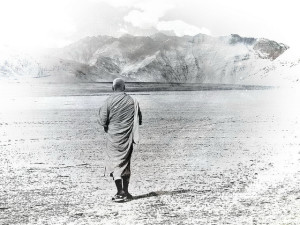
Photo by h.koppdelaney
Over two million children have been impacted by the recent Nepal earthquake; over half a million people rendered homeless; and thousands dead.
Natural disasters routinely play havoc with our lives and their impact is staggering. Behind each of these statistics are untold heart-rending stories of individual human suffering – of orphaned children, destroyed marriages, parents who lost their child, and the innumerable others who face the prospect of a life full of agony and hardships.
These events shake us to the core – and our faith. For the religious amongst us, we wonder about the existence of God and his justice – why would he want millions of innocent people to suffer this way. For the spiritual, it’s baffling to come to terms with the extent of individual suffering and what caused it. I have been wrestling with these questions lately and here are my thoughts.
Three concepts worth reviewing
1. Nature and its laws
Natural disasters are not disasters in themselves. They are events that emanate from the natural working of the universe and follow its laws. However, as humans, we are conditioned by our bi-polar evaluation of every situation as good or bad based on how it affects us. Given the scale of physical, emotional and financial damage such events wreck on human life, we clearly take them personally and experience them as evil.
The universe is unfolding as it needs to. The sun rises and sets as it needs to, the clouds turn into rain as they need to, and the plants are born – some to become trees and some to die early – as they need to. Likewise, earthquakes, volcanoes and cyclones are a natural outcome of earth’s evolutionary process.
2. Human will and individual karma
When impacted by these events, we do gravitate to wondering if it’s our personal fault or bad karma. Questions like, why is this happening to me, what have I done to deserve this, is this God or Universe’s way of punishing me, flood our mind. The reality is these events are agnostic to the goodness, integrity, faith, race or color of their victims. They are in no way a form of punishment directed at the affected individuals.
Further, it is important to realize that while the concept of karma is truly relevant for our psychological destiny, it is not necessarily for our physical and material reality. What we experience at the level of our psyche and inner state is a direct reflection of our cumulative thoughts, intentions and actions – every time we are kind to someone we feel good within, every time we resent something we feel irritated. However, what manifests in our lives at the physical level is influenced by another dimension as well – that of the superseding laws of nature. That’s why a corrupt businessman can be wealthy and a saint meet with an accident. The law of karma is very clear on this aspect and that is why it is futile to blame our individual selves for being a victim of any of nature’s tragic events.
3. The purpose of human life
Witnessing tragic death of loved ones, particularly of young children, creates insufferable pain for the survivors. Living through it plainly seems pointless. However unbearable and despairing our lives may appear in such circumstances, there’s potential for a meaningful purpose to every human life.
Besides all the external roles we play in our lifetime, there is an inner purpose that’s universal to all human existence and that is to utilize all the time we have available in human form towards nurturing and evolving our eternal soul (the core of our being). In this regard, every personal crisis can be a powerful teacher towards fulfilling our purpose. As Rumi said, “The wound is the place where the light enters you.”
Experiencing irreparable loss could become a pathway to deepening our sense of detachment, softening our ego, acquiring resilience, and learning to be compassionate towards ourselves and others.
Three lessons for us all
1. Human role in reducing these disasters
As much as these disasters are not a reflection of the specific deeds of the impacted individuals, they are sometimes an expression of the growing ecological imbalance with which humans are collectively living with mother earth. They are an alarming reminder that the excessive focus on material progress at the cost of negative environmental impact is like a cancerous organism that would eventually kill the whole.
There is a definitive need for us to moderate our singular obsession with economic growth and learn to be more mindful of the effect our daily actions are causing the environment. Aligning our actions with the rhythm of nature and its laws will eliminate the excessive reactions of the earth.
2. Committing to reforming our individual responses
Further, it’s important to recognize that it’s not what happens to us at the physical and material level, but how we respond to it, that has a deep impact on our inner state – and, the ongoing cycle of karma.
Although a steep uphill climb, it is possible to work on making peace with our reality and reframing our outlook towards our disturbing circumstances. Starting with learning to not blame or pity ourselves (as it is not our individual fault), we can practice meditation or other reflective techniques to connect within; tap into our inner source of strength and wisdom; and experience the power of acceptance and living in the moment. Working with alleviating the suffering of others, many of whose distress may be much higher than our own, can heal our wounds and provide us a sense of meaning.
Post the Hindu-Muslim riots during India’s partition, a Hindu father, who had lost his son in the riots, approached Mahatma Gandhi to protest against his preaching of non-violence. The man believed that he should be allowed to seek appropriate revenge. Gandhi instead proposed that the man look out for a Muslim child, whose father has been killed in the violence, and adopt him. This action, he said, would be an example of greater acceptance, love and harmony for everyone.
3. Appreciating the fragility of human life
Whether we are directly impacted by such events or not, they are a reminder of the fragility of human life. Facing death and similar crisis sharply bring into focus what’s truly important in our life; it cajoles us to become more aware of the very purpose of our existence.
As we start to see the ephemeral nature of all our sensual experiences, we learn to become less identified with our physical self and begin to realize the limitations of our vain pursuits – after titles, power, money and external success. Clarifying our life’s purpose and committing to live it without getting distracted by these temptations can help us make our life, however long or short, to be happier and meaningful.











 Happy For No reason!
Happy For No reason! Demystifying Death
Demystifying Death I Am Okay, You Are Not
I Am Okay, You Are Not Insightful Lessons From Our Body’s Innate Wisdom
Insightful Lessons From Our Body’s Innate Wisdom